Lors de leur passage à la Rock School Barbey à Bordeaux en Octobre, La Face B a rencontré le groupe new-yorkais Bodega pour une discussion à cœur ouvert. Entre humour et sincérité, Ben, Nikki, Tim, Adam et Dan partagent leur processus créatif, leur regard sur le consumérisme, et leur lien unique avec New York. Avec des inspirations littéraires et cinématographiques marquantes, Bodega dévoile l’essence de leurs derniers projets, dont Our Band Could Be Your Life et Brand on the Run. Bodega nous entraîne dans son univers percutant, porté par une énergie brute et des mélodies accrocheuses, au service d’une critique sociale affûtée. Découvrez un groupe audacieux pour qui chaque chanson se transforme en manifeste créatif, mêlant ironie et engagement.
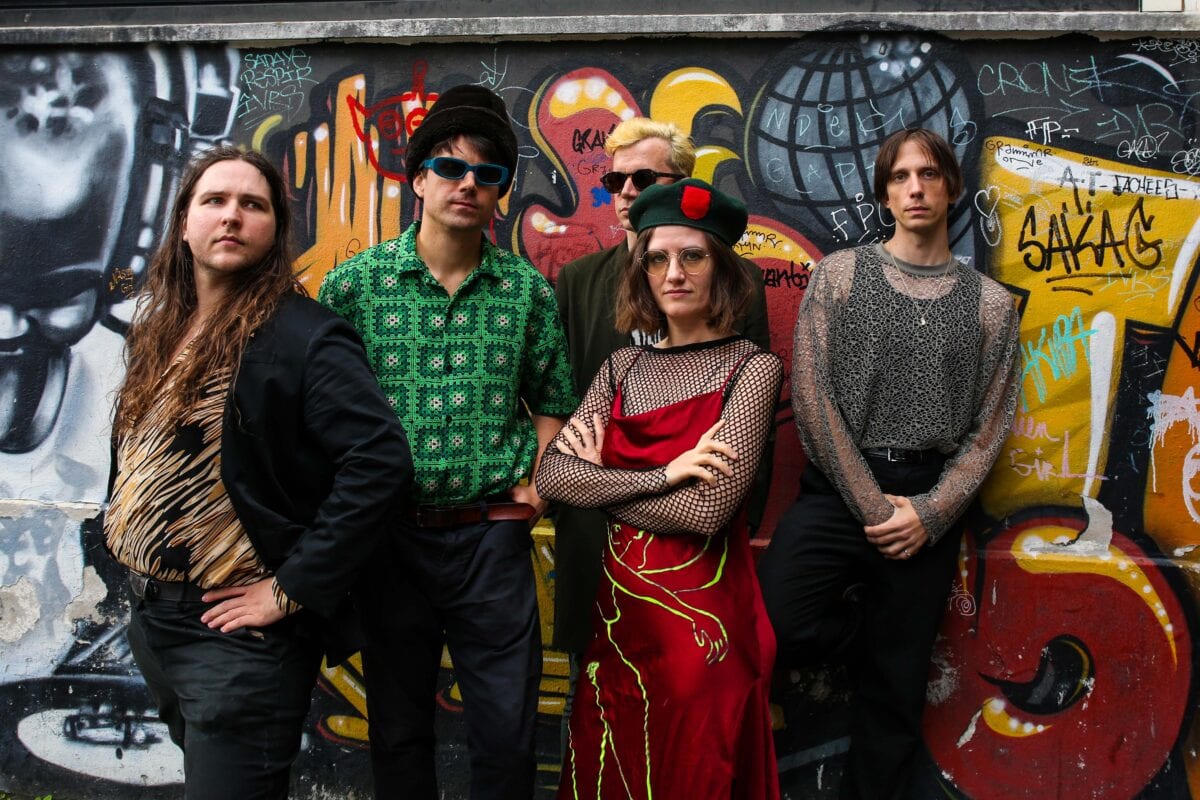
« Avec l’évolution de Bodega, on a cherché des moyens d’être nous-mêmes et de créer notre propre son. C’est le meilleur des deux mondes : tu peux avoir un son dur tout en étant mélodique et explorer différentes émotions. Je pense qu’en revisitant nos chansons, on trouve un moyen d’avancer. Et maintenant, on écrit le prochain album, qui est bien plus mélodique, bien plus musical, et encore différent ». Ben Hozie
Retrouvez également le travail d‘Alexia Arrizabalaga-Burns (sous le pseudo Troubleshooteur) sur son site et sur Instagram
La Face B : Bonjour Bodega ! Ravi de vous rencontrer, j’écoute votre dernier album en boucle. Vous vous appeliez initialement Bodega Bay, et vous avez choisi votre nom en référence aux Bodegas new-yorkaises pour devenir Bodega.
Ben : En fait, Bodega Bay, notre nom d’origine, n’était pas en référence aux épiceries. C’était un clin d’œil au cinéma, au film The Birds! L’histoire se déroule à Bodega Bay, une ville fictive. Bien sûr, on aimait aussi ce nom parce que les épiceries Bodega sont un symbole de New York. Il y a donc une sorte de double sens.
Nikki : Et vous serez peut-être intéressés de savoir que nous envisageons de changer de nom. On verra ce qui se passera.
La Face B : Vraiment ?
Ben : On n’est pas sûrs.
Nikki : Ce sera très similaire, on va changer seulement une lettre.
Ben : On va d’ailleurs sortir un disque l’année prochaine qui s’appellera Nodega, la version hardcore du groupe.
La Face B : Est-ce que New York vous manque quand vous êtes en tournée ?
Nikki : New York ne me manque pas, mais je suis toujours contente d’y revenir.
Ben : Pour ma part, quand on a commencé, je voulais très consciemment sonner comme un groupe new-yorkais. Par là, je veux dire deux choses : d’abord, créer une musique qui reflète ce que vivre en ville signifie. C’est rythmé, énergique, ça réclame votre attention, et ce n’est pas du tout relaxant. Ensuite, s’inscrire dans la lignée musicale de New York, que ce soit pour moi le folk des années 60 de Greenwich Village, une écriture narrative. Il y a aussi une touche de hip-hop des années 80, notamment le hip-hop blanc avec des groupes comme les Beastie Boys.
On retrouve aussi un côté The Velvet Underground, Sonic Youth, le punk artistique, et des groupes plus récents comme The Beets, The Babies, ou Parquet Courts. Sans oublier le funk, le dance-punk, et maintenant la scène hardcore du Lower East Side. Tout cela fait partie de notre ADN. Si quelqu’un dessine une chronologie de la musique new-yorkaise, on espère que Bodega y figurera.
Nikki : Je pense qu’il y a quelque chose de particulier dans l’expérience de vivre à New York, qui est différent d’ailleurs.
La Face B : La ville est très vibrante ! Artistiquement et en termes de vie.
Nikki : Oui, on est plus présent chaque jour et chaque moment parce qu’il se passe tellement de choses. Et c’est encore plus génial grâce aux personnalités que la ville attire. Il faut être un extraverti qui adore cet aspect-là, et il faut s’engager. Si tu marches avec tes écouteurs, tu seras obligé d’interagir malgré tout. Bien sûr, il y a des inconvénients, mais ça se traduit dans nos concerts live, comme cette énergie nerveuse qui est toujours en nous et qui doit s’exprimer. On te regarde dans les yeux et on te dit ce qu’on pense. Et je pense que c’est très new-yorkais.
La Face B : Vous avez souvent utilisé le terme Art Rock, je me demandais ce que ça signifie pour vous ?
Ben : C’est un peu bête de dire Art Rock, non ? Parce que tout le rock est de l’art. Mais j’aime ce terme parce qu’il était utile quand je cherchais des groupes à écouter vers 17 ou 18 ans. Si quelque chose était étiqueté art rock, c’était généralement intéressant. Cela pouvait aller de Pink Floyd à Pink Flag et couvrir tout le spectre. Ça signifie juste une musique rock qui a une base conceptuelle, qui va au-delà du simple fait de faire des chansons ou des sons intéressants.
Nikki : C’est trop large quand même. J’aimerais bien qu’on ait notre propre classification.
La Face B : Dans la chanson The City is Taken, ça reflète totalement cet esprit. On sent l’essence de ce que tu mentionnes dans la chanson. Pour parler de la tournée, vous partez maintenant pour l’Espagne, puis le Royaume-Uni. Comment s’est passée la tournée jusqu’à maintenant, Bodega?
Adam : Très bien.
Tim : Incroyable.

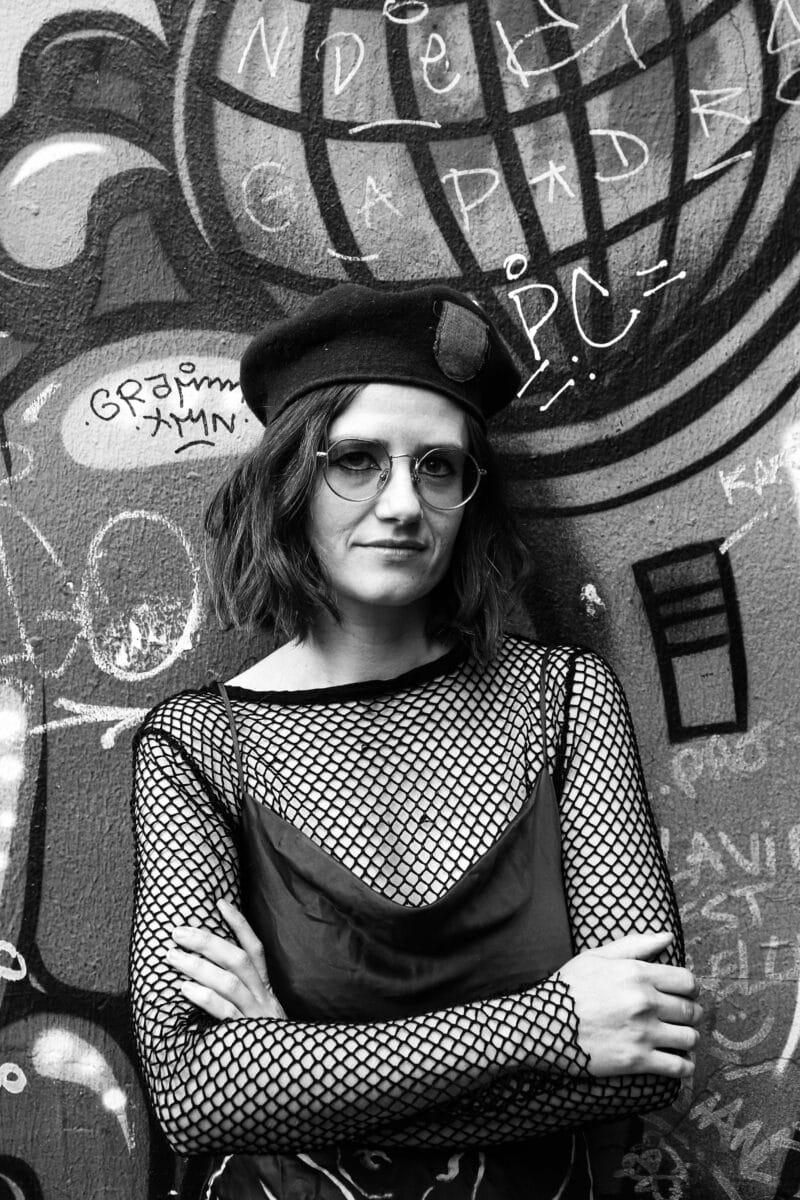
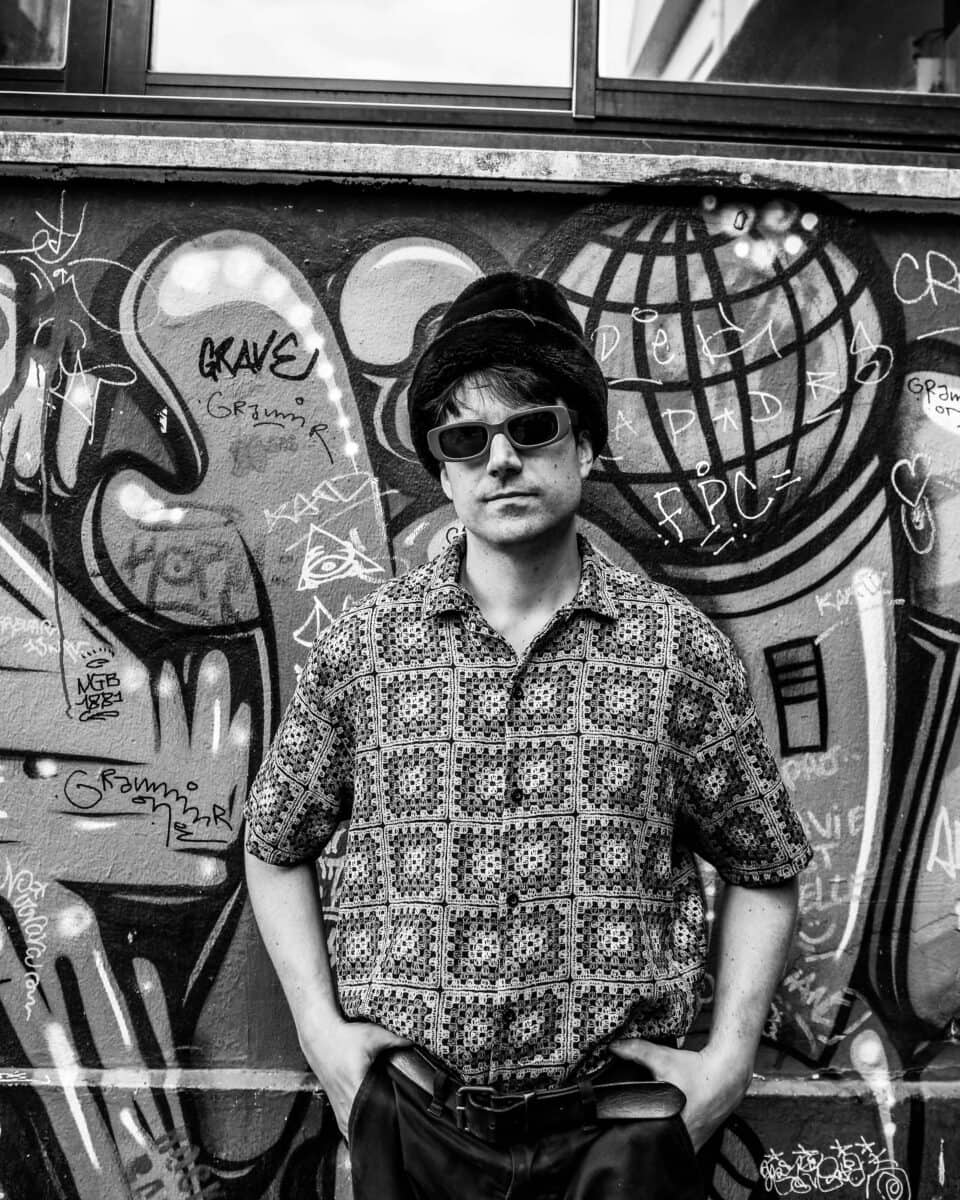
La Face B : Vous jouez le nouvel album en live ; comment le public l’a-t-il accueilli ?
Ben : Je pense que c’est bien. La chanson Tarkovski est très fun parce qu’elle est assez ouverte. C’est une chanson pop assez simple, mais il y a une section au milieu de l’album et un solo qui est à moitié composé, à moitié improvisé. En live, c’est différent à chaque fois et on l’utilise comme un espace pour jammer, ce qui est toujours excitant.
Adam : Il y a quelque chose de nouveau chaque soir, c’est très flexible, et on peut prendre de grands risques. Parfois, on prend un risque et on s’attend à ce que l’autre prenne le relais où on s’est arrêté. L’autre soir, sur Tarkovski, on a fait quelque chose du genre « c’est à toi maintenant ! ». On a élargi la version de Tarkovski, ça nous emmène dans des endroits inconnus, et Tim joue un rôle essentiel en nous emmenant dans de nouvelles zones où on a parfois l’impression de jouer une chanson différente.
Tim : On n’a pas encore atteint la zone ultime.
La Face B : En parlant de Tarkovski, la version studio est extrêmement riche musicalement, donc c’est amusant de voir comment vous pouvez encore l’élargir en live et y ajouter des couches grâce à l’énergie du public, qui nourrit l’ambiance. Pour revenir à Tarkovski, c’est un hommage au réalisateur mais aussi à son livre Sculpting in Time. En quoi vous a-t-il influencés pour que vous lui dédiez une chanson ?
Ben : Alors, il y a dix ans quand j’ai découvert Tarkovski, j’ai lu le livre et j’ai regardé tous ses films. Il n’en a pas fait beaucoup, je pense qu’il en a fait sept. Ça a complètement bouleversé ma vision des choses. Je ne vais pas dire que Sculpting in Time a changé tout mon paradigme, mais ça a vraiment modifié ma perception de l’art pendant environ six mois. Toute sa philosophie dans ce livre était si novatrice, il y avait presque une naïveté. Il explique qu’il ne faut jamais inclure dans un film quelque chose qui ne vient pas directement d’une mémoire, d’une expérience vécue ou d’un rêve. Et les rêves sont vraiment, vraiment importants pour lui. Dans ses films, on voit qu’il enfreint parfois ses propres règles en ajoutant des éléments qui ne sont manifestement ni des souvenirs ni des rêves.
Pour moi, la chanson Tarkovski parle de cette tension entre la théorie et la pratique, un des thèmes les plus intéressants et récurrents dans nos chansons. Ça résume bien notre approche de la création artistique. Nous sommes un groupe très théorique, avec beaucoup de règles, on se dit qu’on ne va pas faire des chansons sur tel ou tel sujet, et pourtant, on finit toujours par faire quelque chose de différent. On joue un genre totalement différent, ou on fait des choses juste pour l’art, ou on perd complètement la prémisse initiale, et c’est bien comme ça. C’est ça, l’art. Mais je reviens toujours à un des thèmes centraux de notre groupe, cette tension entre le poétique et l’analytique, et je pense que c’est vraiment de cela que parle cette chanson.
Nikki : Tarkovski est l’une de nos chansons les moins poétiques au niveau des paroles, elle est moins directe que Broken Equipment. Il y a moins d’images qui semblent abstraites.
Ben : Est-ce que vous connaissez son film Stalker ?
La Face B : Non.
Ben : L’intrigue du film se passe dans un endroit fictif appelé The Zone, c’est un territoire de science-fiction en pleine forêt, et si tu y vas, la Zone peut exaucer un souhait. Mais ce qui se passe vraiment dans la Zone est compliqué. Elle ne te donne pas ce que tu demandais, elle regarde dans ton subconscient et t’offre ce que tu désires vraiment. Par exemple, si tu y vas en disant que tu veux guérir le cancer, ce que tu souhaites vraiment, c’est peut-être de coucher avec le mari de ta sœur.
Nikki : Non, non, non !
Bodega : (Rires)
Ben : D’une certaine manière, c’est comme la création artistique. On peut vouloir faire une chanson avec une certaine idée en tête, mais c’est ce que j’adore dans l’art : il révèle nos pensées les plus profondes et inavouées. Ce qui devait sortir finit toujours par sortir, et c’est ça, la Zone.
La Face B : Je comprends ça comme la tension entre ce que la société attend de nous et nos désirs et rêves personnels. J’ai interprété la chanson comme un dilemme entre les choses superficielles de la vie et ce qui est au plus profond de nous-mêmes.
Ben : Quand j’ai commencé à jouer ce riff, je pensais, tu sais, tu veux du hardcore, mais au fond, tu n’en veux vraiment pas. Il y a beaucoup de gens, surtout quand ils sont jeunes, qui se donnent un air plus dur et plus coriace qu’ils ne le sont vraiment. Je pensais même à cela dans les relations.
La Face B : C’est comme ces gens qui disent qu’ils sont fous, mais en réalité, ils sont ennuyeux à mourir. Alors que toi (montrant du doigt Adam), on sait. Tu n’as même pas besoin de parler.
Bodega : (Rires)
Tim : Il est namaste à l’extérieur et chaos à l’intérieur.
La Face B : Le clip est absolument brillant ! Je l’ai adoré ! C’est une référence aux gens toujours accrochés à leurs téléphones et leurs écrans. On voit cette dame qui marche, on se demande ce qu’elle fait, et puis elle regarde une bougie qui brûle sur un iPad. Quelle est la vision artistique derrière ?
Ben : Il y a deux références à Tarkovski : l’une est Stalker, avec la marche dans la forêt et la zone ; l’autre est un film qui s’appelle Nostalgia. À la fin, on voit un homme qui doit marcher d’un bout à l’autre d’une piscine vide avec une bougie et garder la flamme allumée. S’il y parvient sans que la flamme s’éteigne, cela aura une grande signification car personne n’a pu le faire. Tarkovski fait des choses très tarkovskiennes, comme vous faire regarder ça pendant dix minutes. Apparemment, ils ont dû refaire la scène plusieurs fois sans que la bougie ne s’éteigne.
Nikki : C’est ce qu’on a essayé de faire dans la première prise.
Ben : C’est exactement le même motif, mais la bougie est sur un iPad.
La Face B : J’ai trouvé le concept brillant et moderne… Et la dame, c’était ta mère !
Nikki : Oui, c’était ma mère.
Ben : Tout le pèlerinage était pour aller à un distributeur de billets (ATM).
Adam : Vraiment, c’est une grande intervention sur la mère de Nikki.
Bodega : (Rires)… Oui !
Nikki : Oui, toute ma famille !
Adam : Ce sont des hippies !
Nikki : Elle adore Candy Crush un peu trop.
Bodega : (Rires)


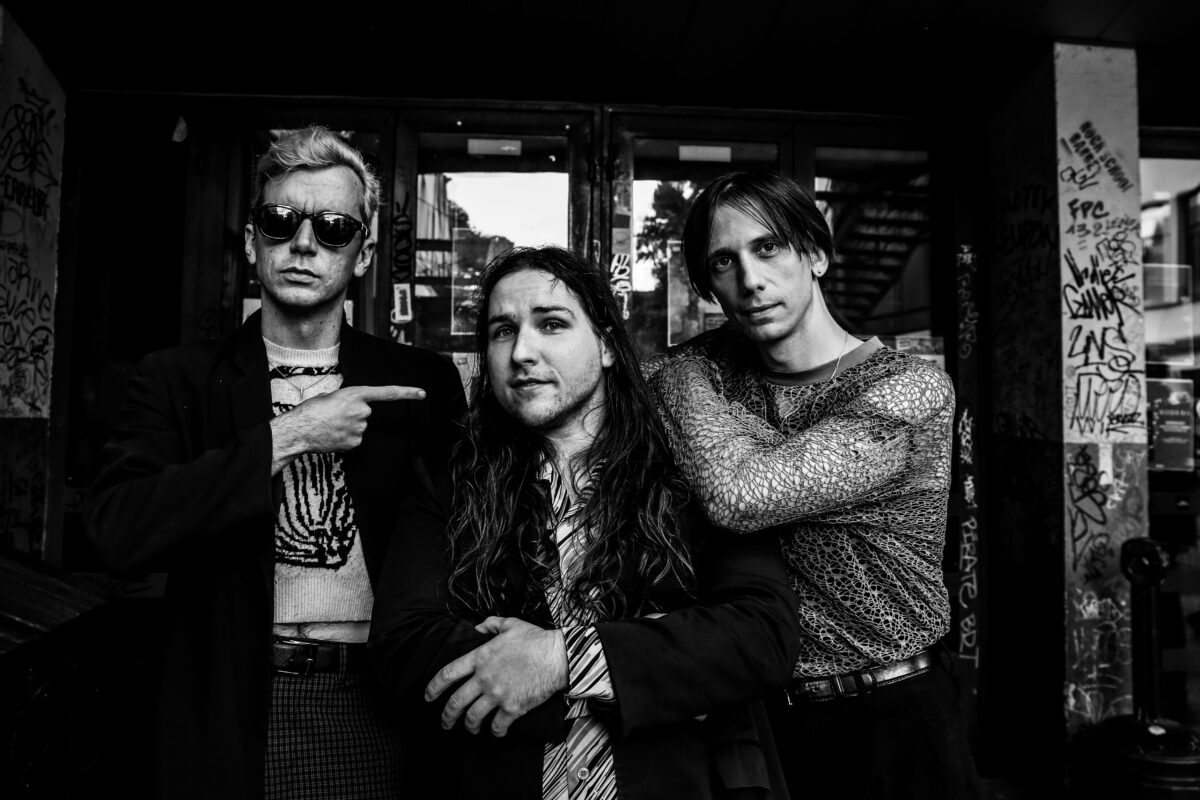
La Face B : Votre nouvel album sort le 1er novembre, en version Deluxe – Brand on the Run
Ben : Ce sont sept nouveaux morceaux conçus pour compléter l’album que nous avons sorti plus tôt cette année. Certaines ont été enregistrées après coup. Trois d’entre elles ont été réalisées par Tim en mai. Quelques morceaux datent de la session d’enregistrement de l’album, comme The Adaptation of The Truth about Mary, qui est l’une de nos meilleures chansons. Mais on avait plusieurs ballades et on ne voulait pas en mettre plus de trois sur l’album. Quand on sortait des singles, j’aimais que les groupes mettent une B-side avec l’A-side. C’est un truc des années 60, comme les Smiths, qui faisaient de super B-sides. C’est un peu perdu, les B-sides, car quand les gens mettent des morceaux sur Spotify, il n’y a plus vraiment de B-side vu qu’il n’y a pas d’incitation pour les gens à acheter le CD ou le 45 tours.
Nikki : On a poussé le concept à l’extrême parce qu’on a aussi des albums de B-sides.
Ben : Je trouve ça cool parce que ça te libère pour faire des morceaux qui peuvent exister séparément de l’album. J’aime associer une B-side de manière thématique avec la piste principale. Par exemple, la chanson Thrown accompagnait Everybody’s Sad, qui mentionne Thrown dans ses paroles. C’est un complément. The Adaptation of the Truth about Marie est aussi inspirée d’un roman de Jean-Philippe Toussaint. Tarkovski est inspiré du livre de Tarkovski. City is Taken est associée à New Age Spineless Sophists (N.A.S.S.), car elles dissèquent toutes deux la scène new-yorkaise. Cultural Consumption III est associée à Cultural Consumption IV pour des raisons évidentes.
La Face B : Les tracks de Cultural Consumption forment un triptyque, mais musicalement, elles peuvent exister de manière indépendante même si elles partagent le même titre. Mais elles sont liées. Maintenant que tu mentionnes The Adaptation about The Truth about Marie, le clip est extrêmement drôle. J’aimerais savoir comment tu as réussi à condenser l’histoire en une chanson de trois minutes et quel a été le choix créatif pour le clip ?
Ben : Ce livre m’a tellement marqué. Pour moi, le meilleur moyen de créer, c’est de s’inspirer d’un autre artiste. Quand tu lis un livre génial, tu te dis “Wow, c’était tellement bien, je dois créer quelque chose en réponse.” C’est le but de faire de la musique de toute façon. Tu veux que quelqu’un écoute ta chanson et pense qu’il doit y répondre, que ce soit par une peinture ou une autre chanson. J’avais aussi eu cette idée un peu malicieuse de faire un film à l’époque qui serait une adaptation d’un tableau, car j’aime cette idée d’adaptation.
Les cinéastes adaptent tout le temps des romans, pourquoi un auteur-compositeur ne pourrait-il pas essayer ça comme exercice ? J’ai essayé de raconter un peu l’histoire, mais ce qui m’a vraiment marqué dans ce roman, c’est cette situation dramatique. Le gars reçoit un appel de son ex-copine dont il est toujours amoureux. Elle lui dit qu’elle est avec l’homme pour qui elle l’a quitté, qu’il est en train de faire une crise cardiaque, et qu’elle a besoin de son aide. C’est tellement incroyable !
Nikki : Tu adores les histoires d’amour.
Ben : C’est tellement français, parce que ça parle de sexe et de mort. Il y a aussi tout un truc autour des fluides, elle a ses règles, il pleut dehors, c’est tellement cinématographique et élémentaire. C’est incroyable. J’ai relu les quatre livres récemment et ça m’a bouleversé. J’adore cette situation dramatique. Je pensais comme un cinéaste. Si je devais adapter deux chansons, qu’est-ce que j’aimerais que ce personnage fasse ? J’ai ajouté un élément que je trouvais plutôt malin. Le personnage ment : dans le premier refrain, il dit “tu m’as parlé de ce gars-là, comment il s’appelle déjà ?”, mais la deuxième fois, alors qu’il se rapproche de l’intimité, il admet qu’il connaît son nom et tout de lui. Le point culminant est qu’il est la troisième personne de la scène, dans un rêve. Il est le troisième dans un triangle amoureux.
Nikki : Et pour le clip, quelle a été l’inspiration ?
Ben : Parce que j’ai relu le livre dans la baignoire. Mon passe-temps favori, c’est de prendre un bon verre et de me plonger dans un bain chaud pendant quatre heures avec un livre, surtout en hiver.
La Face B : Je suis tellement maladroite, impossible pour moi de lire dans le bain.
Nikki : Moi, parfois, je suis sur mon téléphone dans le bain.
Ben : Elle est sur son téléphone dans le bain, et je lui dis “tu vas frire”.
La Face B : Tu as une approche très cinématographique dans ton processus créatif. Tu dis que tu écris toujours les paroles en premier.
Ben : Pas toujours, mais disons cinq fois sur huit.
La Face B : C’est parce que tu es avant tout un conteur.
Ben : Je pense que oui, mais beaucoup de gens, quand ils écrivent une chanson, ils marmonnent une mélodie, créent un riff et ajustent ensuite les paroles. Neuf auteurs-compositeurs sur dix font comme ça d’après ce que je sais. J’ai déjà travaillé de cette manière, mais ce que j’ai découvert, c’est que si tu écris un poème avec un certain nombre de syllabes par ligne et un mètre, ton phrasé devient moins cliché, et ça rend tes mélodies plus intéressantes, car elles doivent s’adapter à un texte qui est déjà là.
La Face B : Mais c’est contraignant car il faut remplir un certain nombre de syllabes, et ça peut être restrictif.
Nikki : Tu peux à peu près tout faire rentrer dans une mélodie.
Ben : Ça peut changer. Si tu écris les paroles, elles vont changer quand elles sortent de ta bouche.
La Face B : Dans votre nouveau processus créatif, est-ce que tous les membres de Bodega participent aux paroles et écrivent leurs parties ?
Tim : Adam a écrit les paroles des morceaux récents.
Adam : Je pense que j’ai fait un peu plus que ça.
Ben : Nikki et moi partons de l’embryon d’une idée. Et Nikki est assez critique vis-à-vis de mes paroles. En général, ça implique que je les réécrive jusqu’à ce que Nikki les valide. C’est pareil pour elle et ses chansons. Ensuite, on montre le résultat à Dan, qui aide avec les arrangements et écrit ses propres parties de guitare et d’autres éléments. Ensuite, on amène tout ça au groupe et, si on en a le temps, on la joue en live, on la teste sur scène et on l’adapte.
Nikki : Un aspect du processus est qu’Adam et Dan ne vivent pas à New York. Ils vivent à Philadelphie et Baltimore, ce qui est à plusieurs heures de route. Donc, le processus de création d’une chanson de manière organique dans un même espace n’est pas possible pour nous, car on ne se retrouve dans un même espace que lorsqu’on travaille déjà.
Ben : L’un des points forts de notre groupe, c’est que ces deux-là viennent du jazz. Dan a un groupe qui s’appelle Super City, Adam a un groupe qui s’appelle The Lunar Year. Dan est aussi impliqué dans d’autres groupes. Tim a également un groupe appelé Big Bliss. Je travaille avec d’autres groupes, et Nikki travaille désormais avec d’autres groupes. Nous sommes tous très à l’aise avec la musique.
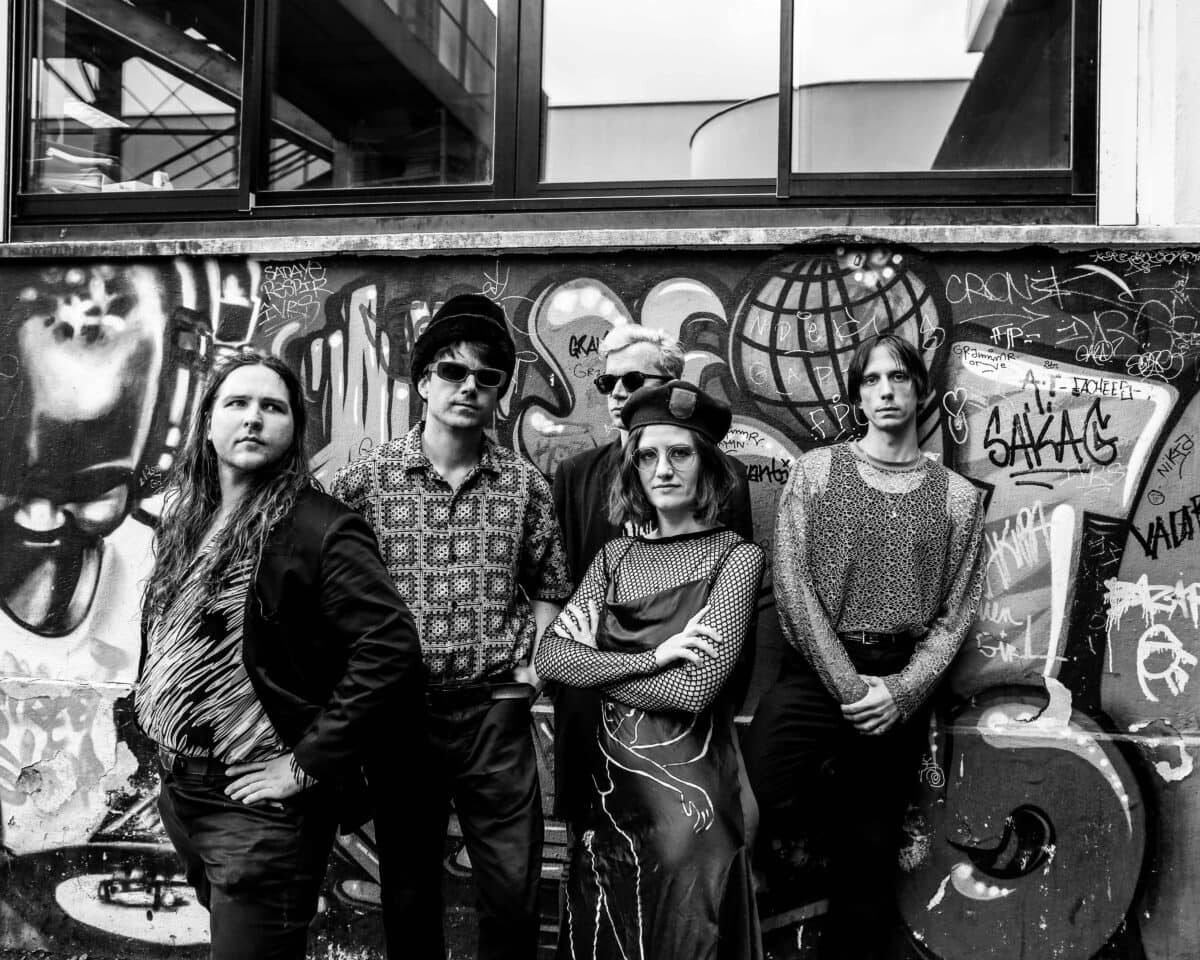
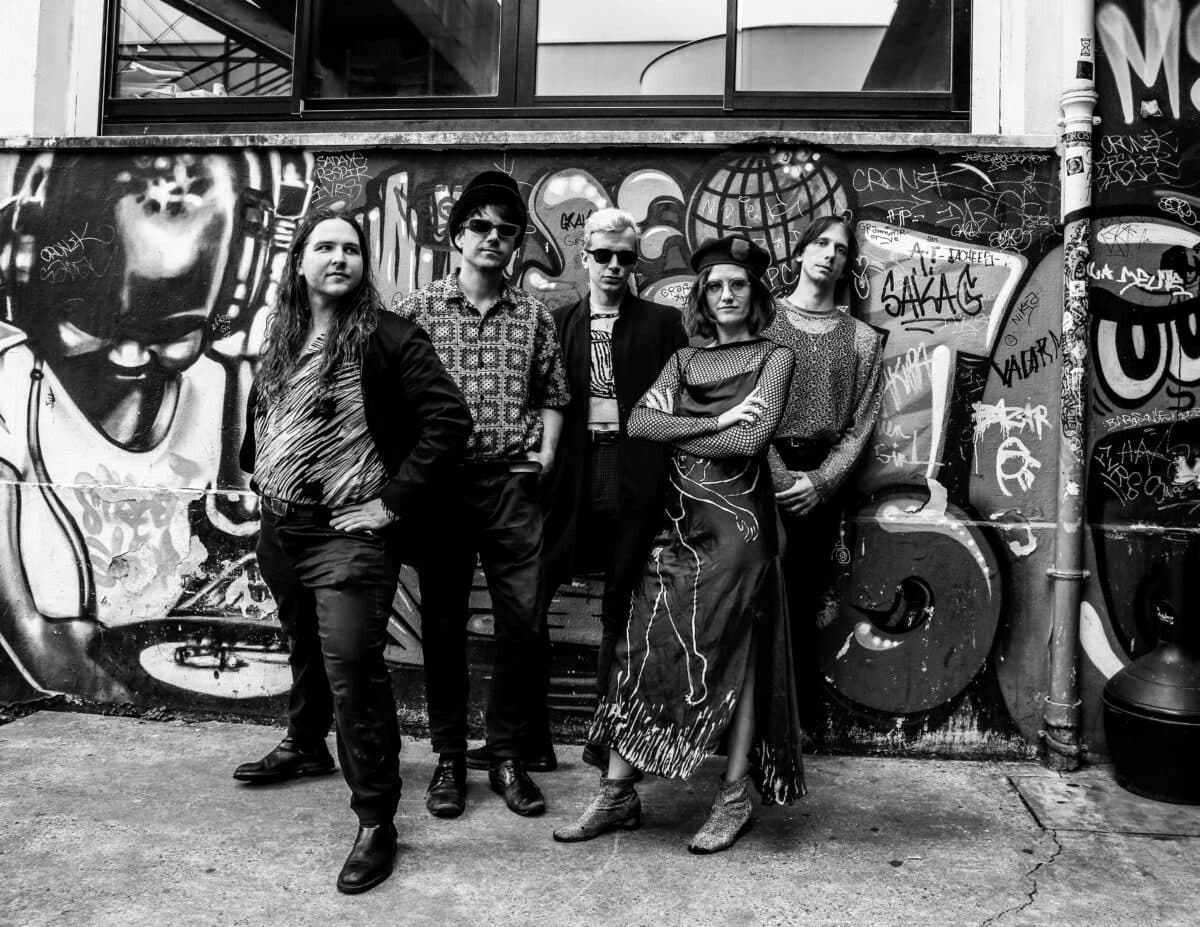
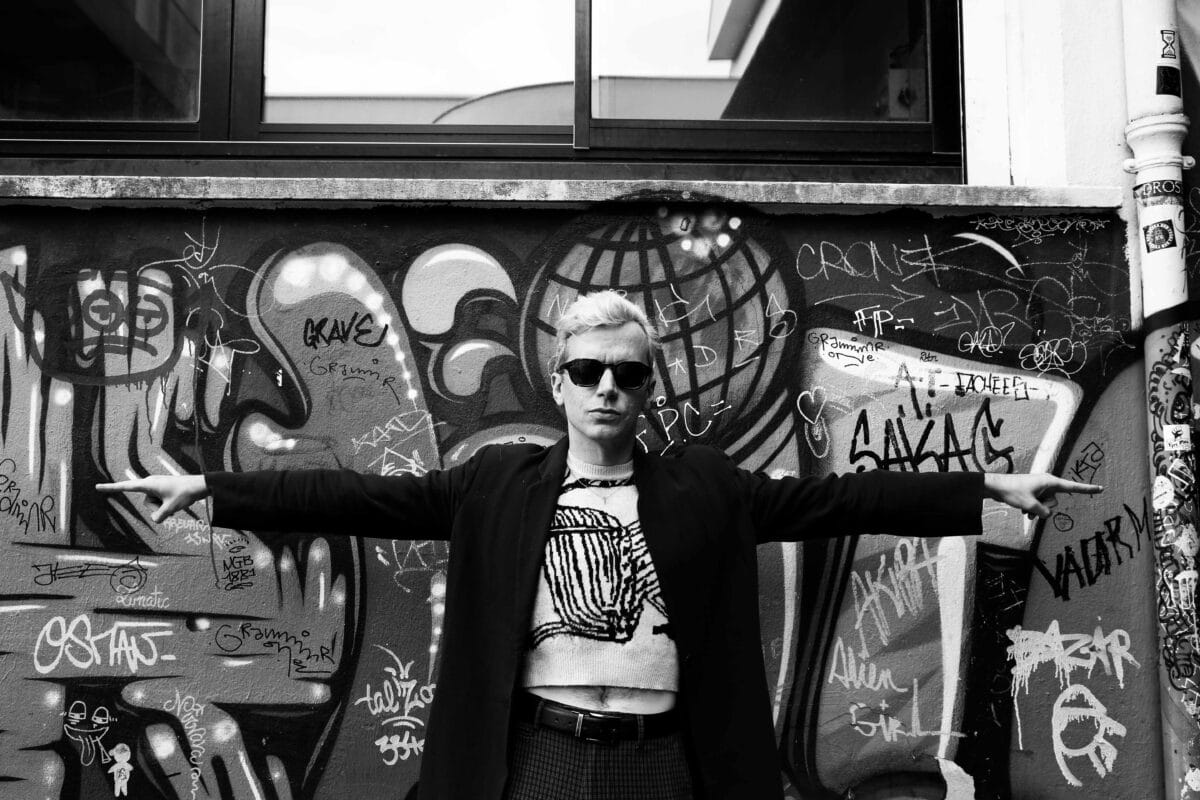
La Face B : L’album Our Band Could Be Your Life, en avril, a été inspiré par le livre de Michael Azerrad. En quoi cela vous a-t-il permis de prendre du recul pour avancer en tant que Bodega? Cet album revisite des morceaux du passé, en quoi revenir en arrière était-il essentiel pour ce processus ?
Ben : L’un des thèmes du groupe, c’est que Bodega Bay, au départ, était dans la confrontation musicalement. Au début, on voulait jouer des morceaux un peu comme les Beatles. Ensuite, j’ai réalisé que nos idées n’étaient pas bien transmises parce que beaucoup de gens entendaient le groupe et supposaient que c’était de l’indie. C’était un projet artistique conceptuel. Quand on a fait notre premier album, on s’est présenté de manière plus austère et minimaliste, et on a un peu retiré l’ironie de notre musique.
Ce que j’aime chez Bodega Bay, c’est que quand tu chantes une chanson pop joyeuse avec des paroles diaboliques, il y a une ironie, mais si tu joues de la musique sérieuse avec des paroles sérieuses, il n’y a pas d’ironie. Paradoxalement, on a connu un grand succès avec Endless Goals. Au bout de cinq minutes d’écoute, tu comprends d’où ils viennent, tu saisis l’essence du groupe.
Mais avec l’évolution du groupe, on a cherché des moyens d’être nous-mêmes et de créer notre propre son. C’est le meilleur des deux mondes : tu peux toujours sonner dur tout en étant mélodique et en explorant différentes émotions. Je pense qu’en revenant en arrière, surtout avec ces gars-là qui trouvent de meilleures façons de jouer nos chansons, on trouve un moyen d’avancer. Et maintenant, on écrit le prochain album, qui est bien plus mélodique, bien plus musical, et c’est différent. C’est sa propre identité.
La Face B : Dans cet album, vous abordez beaucoup le consumérisme. Je sais que les morceaux ont été écrits il y a quelques temps, mais ces sujets sont encore plus pertinents et d’actualité.
Nikki : C’est ce qu’on pense aussi !
La Face B : Ce que vous écriviez il y a huit ans est toujours d’actualité, même encore plus aujourd’hui. Dans votre nouvel album, vous allez continuer le combat ?
Nikki : On essaie activement d’éviter certains mots-clés, mais on continuera d’en parler.
Ben : On a pensé à Our Band Could Be Your Life, Broken Equipment et Witness Scroll comme une trilogie. Les trois se complètent thématiquement et musicalement de différentes manières. Le prochain projet est Nodega et traite du consumérisme, mais le quatrième album officiel sera différent et autonome.
Nikki : En tant qu’artistes, nous sommes très conscients de l’environnement dans lequel nous vivons, surtout Ben. Mais on essaie activement d’aborder d’autres sujets. Je me suis rendu compte que je n’avais jamais écrit de chanson d’amour.
La Face B : Our Band Could Be Your Life peut être complexe et éclairant en tant qu’œuvre. J’ai apprécié ATM.
Nikki : Tu devrais voir les mains de Dan quand il fait le solo de ATM.
La Face B : Vous êtes des observateurs aigus de la société.
Nikki : Nous sommes comme des bouffons.
La Face B : J’ai beaucoup aimé Born Into By What Consumes. Je pensais que ça pourrait être la piste d’intro qui donne le ton de l’album. Elle est placée au milieu, mais elle aurait très bien pu faire office de premier morceau pour une intro percutante.
Ben : C’est le manifeste de l’album. Cette chanson s’appelait à l’origine Cultural Consumption V.
La Face B : ATM a une ambiance très années 90, assez fun et shoegazy. Pour la dernière chanson, c’était génial que Nikki la chante, et le clip présente New York comme le deuxième personnage principal.
Nikki : Ça revient à la première question que tu nous as posée sur l’influence de New York sur nous en tant qu’artistes. Cela encapsule bien les dix années où j’ai vécu là-bas. En particulier, vivre à travers la gentrification et les changements. Être un artiste te donne presque un sentiment de prédateur dans les espaces que tu occupes. Réaliser que la culpabilité ne te mène pas loin n’est pas utile, car elle tend à te paralyser et te rend moins intéressant. Mais en même temps, ce n’est pas seulement ton fardeau, et tu ne devrais pas le porter seul.
La Face B : Merci beaucoup pour votre temps et cet échange enrichissant.
Bodega : Merci, tes questions étaient vraiment bien réfléchies !
Retrouvez Bodega sur Instagram, Spotify ou en Live
Enfin, retrouvez les articles d‘Alexia Arrizabalaga-Burns dans La Face B
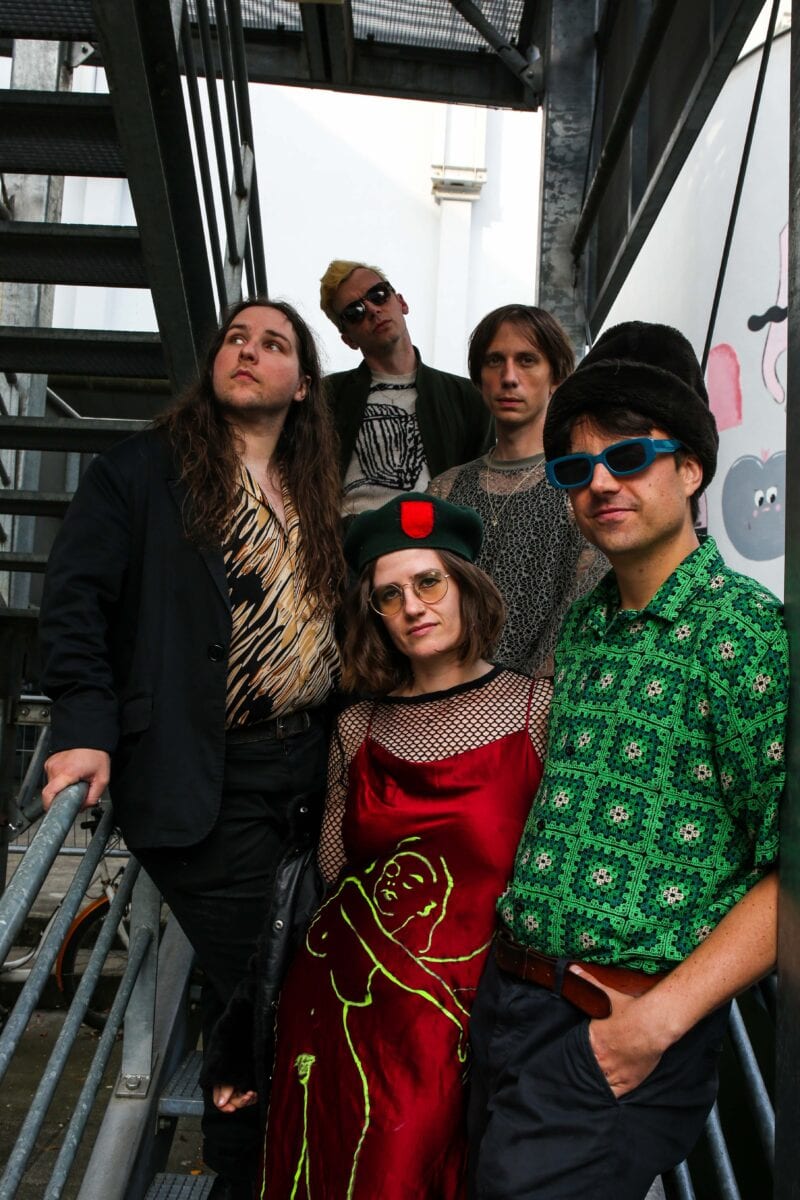
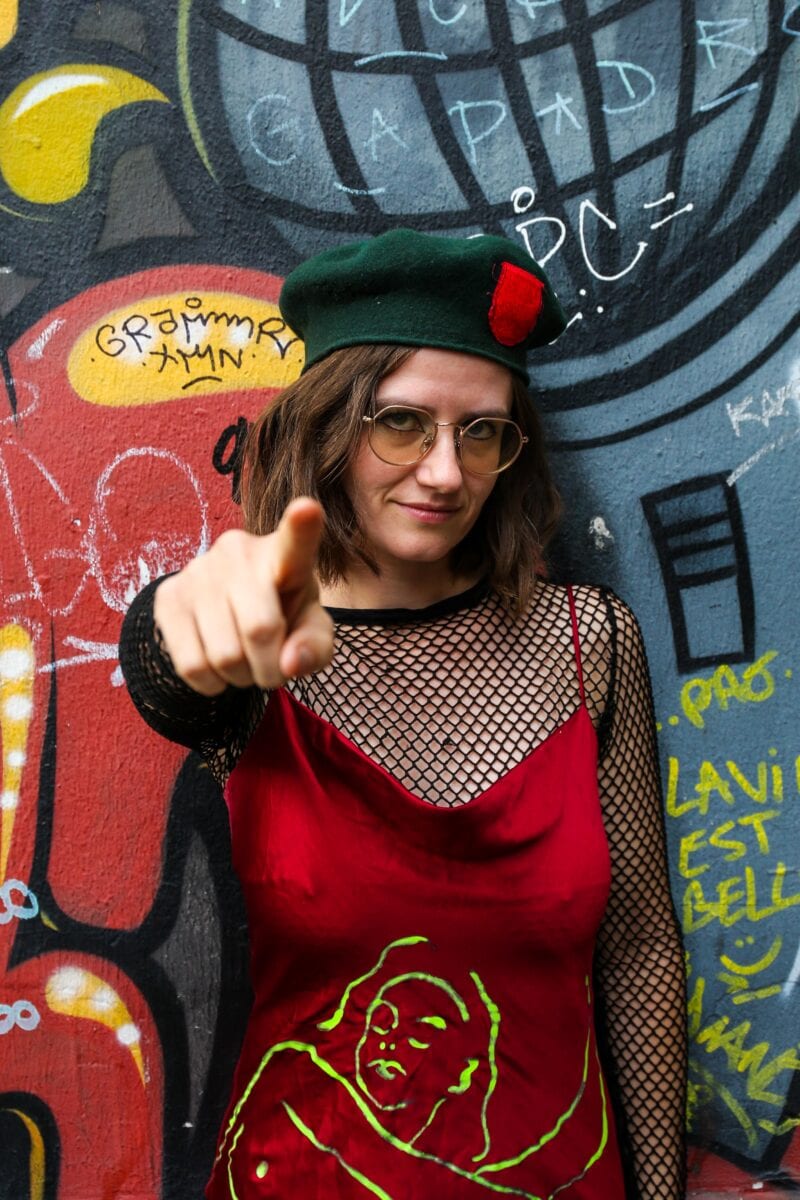
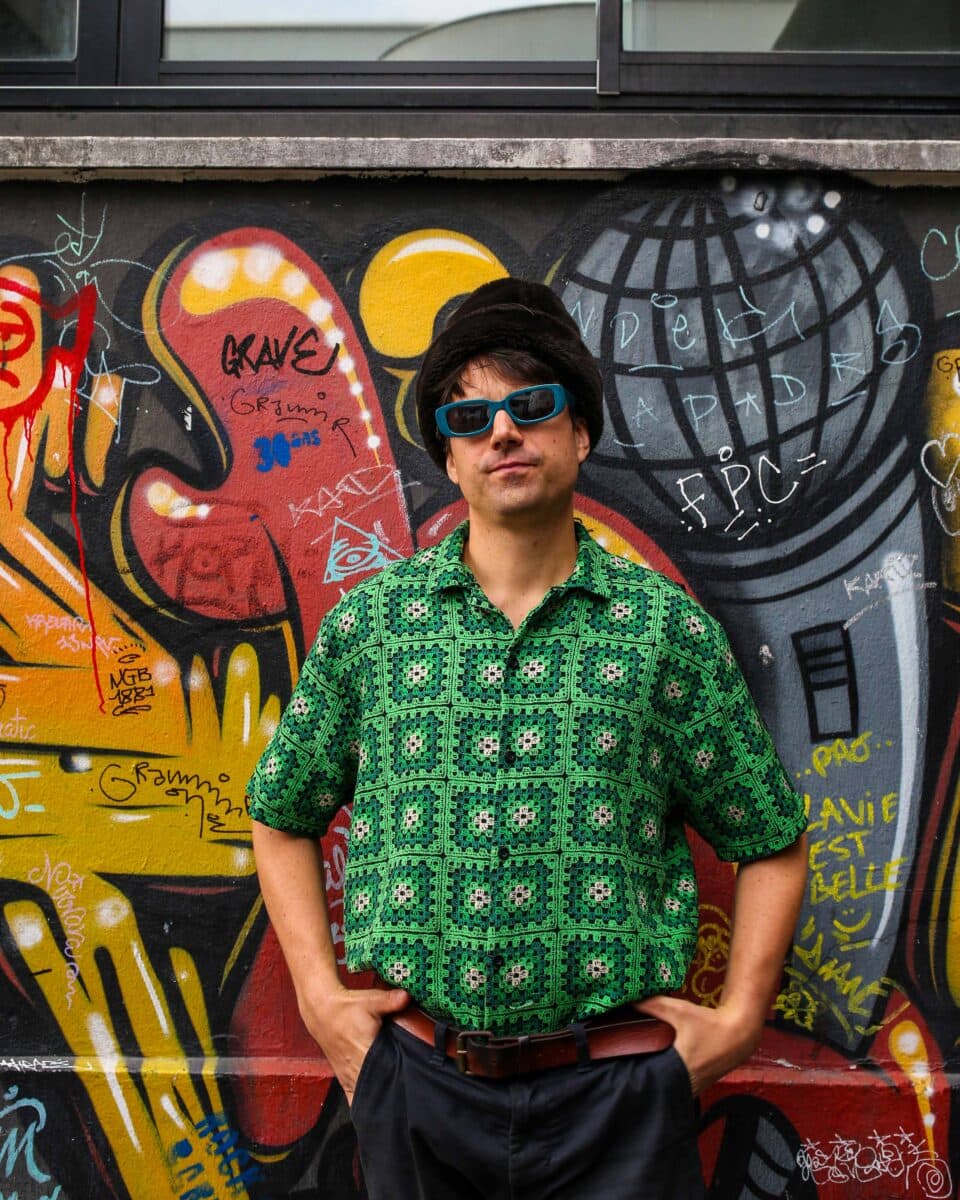
Version en Anglais
La Face B: Hello Bodega! Very pleased to meet you as I have been listening to your last album on a loop. Initially Bodega Bay, you picked your name from the New York corner shops in New York City to become Bodega.
Ben: Well, Bodega Bay, the original band name was not in reference to the corner shop. It was a cinema reference from The Birds! It is set in Bodega Bay, the town, a fictional town. Of course, we liked it because the Bodega Corner shops are a New York thing. It is kind of a double thing.
Nikki: And you might be interested to know that we may be changing our name. We’ll see what happens.
LFB: Really?
Ben: We’re not sure.
Nikki: It will be very similar but we’ll change only one letter
Ben : We actually have a record coming out next year called Nodega, which is the hardcore version of the band.
LFB: Do you miss New York when you’re on tour?
Nikki: I don’t miss New York but I am always happy to return.
Ben: I was going to say when we first started, I very consciously wanted to sound like a New York Band. What I mean by that is two folds: Make music that reflects what living in the city is like. It is fast paced, caffeinated, it’s vying for your attention, and it is not at all relaxing for the most part. And the second point would be that very soft-consciously drawing on a lineage of New York music whether that for me is folk songwriting like 60s Greenwich Village, a narrative songwriting.
There is an element of 80s hip hop and particularly for us Caucasian hip hop like Beastie Boys. There is an element of chorus of Velvet Underground and Sonic Youth and Art punk bands and more recent bands The Beets, The Babies, or Parquet Courts. Also, all the funk, dance, punk stuff, and now the Lowery East Side hardcore scene. All that stuff is in our DNA. If some of us draw the timeline of New York music, hopefully they will include Bodega in that timeline.
Nikki: I think there is an element of being alive in New York that is different than in other places.
LFB: The city is very vibrant! Artistically and in terms of life.
Nikki: Yes, you are more present every day and every moment because there is so much going on. And more awesome with the personalities it attracts, you have to be an extravert that loves that aspect of It, and you have to engage. If you wear your headphones, you are so going to be forced to engage. There are downsides to that of course, but that translates to our live shows, like our nervous energy that is always in us and needs to be expressed like we will look you in the eye and tell you what it is that we think. And I think that is very New York.
LFB: You used the term Art Rock a lot, I was wondering what do you mean by It?
Ben: It is kind of stupid to say art rock right? Because all rock is art as well. I like the term art rock because it was useful for me when I was checking bands when I was 17 or 18. If there was something labelled art rock, it would usually be interesting. And it would cover anything from Pink Floyd to Pink Flag and the whole spectrum. It just means rock music that has a conceptual framework that is more than just “we are trying to make interesting songs or sounds”.
Nikki: It is too broad though. I would like our own classification.
LFB: In the song “The City is Taken” it is all about that. We can feel the essence of what you mentioned in the song. Talking about the tour, you are now leaving to Spain, then UK. How has been the tour so far, Bodega?
Adam: Very Nice
Tim: Amazing
LFB: You are playing live the new album and how was the audience reception?
Ben: I think it is good. The song Tarkovski has been very fun because it is very open ended. It is a pretty simple pop song but there is a middle section in the album and a solo that is half composed; half improvised. But live, it is different every time and we have been using it as a jamming vehicle so that’s always a kind of thrill.
Adam: There is something new every night and it is very flexible and we can take big risks and something we take a risk and expect the other person to pick up when you left off. The other night on Tarkovski, we did this thing like “you’re going now!”. We expanded the version of Tarkovski and it is going to all kinds of unknown places and Tim has been huge in taking us to new zones where sometimes we are almost playing a different song.
Tim: We have never reached the zone yet.
LFB: Talking about Tarkovski, the studio version is extremely rich musically so it is funny how you can still expand it live and adds some layers with the energy you have from the audience because it feeds the mood. Going back to Tarkovski, It is an hommage to the director but also his book “Sculpting in time”. In what ways did he impact you that you dedicated a song to him.
Ben: So, way back when I first encountered Tarkovski, which was about 10 years ago, I read the book and watched all his films. He does not have many, I think he has seven. It completely flipped the script. I am not going to say I read “Sculpting in time” and it changed the whole paradigm, it just completely changed how I thought about art for like a good six months. And his whole philosophy in the book was so fresh, I thought, there is almost a naivety. He describes you should never include in your film that does not come directly from either a memory or a lived experience or a dream. And dreams are really really important to him. And I found in his own films that he would break his own rules and include many things that are clearly not memories or dreams.
To me, the actual song Tarkovski is about the tension between theory and practice, which is one of the more interesting themes as we had many songs about that theme. It kind of encapsulates many of the practices of art making of our band in general. We have been a very rule, theoretical-heavy band and we are not going to do songs about this or about this but then we end up doing something else anyways. We end up playing a totally different genre or we do things just for art’s sake or we totally lose the initial premise and that’s good. That is what art is. But I always come back to one the key themes of our band, the tension between poetics and analytics and I think that what that song is really about.
Nikki: Tarkovski is one of the less lyrically poetic songs and It is less direct than Broken Equipment. There is less imagery that does not make sense.
Ben: Are you familiar with his movie Stalker?
LFB: No.
Ben: The plot of the movie is there is a fictional place called The Zone and it is a sci-fi territory wood and if you go there, you can get The Zone to grant you a wish. What actually happens in The Zone is really tricky. It does not give what you say, it looks in your subconscious and gives you what you really want. So, if you go there and you say, I want to cure cancer. It would be what you really want is to fuck your sister’s husband.
Nikki: no no no
Bodega: Laugh..
Ben: In many ways, it is what artmaking is like. You may want to do a song thinking we are doing this but that’s what I love about art because it reveals your deepest and untold thoughts. What needed to come out, came out and that’s the zone.
LFB: I understand that as what society expects for you, us versus personal desires and dreams. I understood the song as a dilemma between the superficial things of life versus the deepest inside yourself.
Ben: When I was riffing initially, I was thinking you know you want hardcore, you know you really don’t. There’s a lot of people, especially when they are younger, they put on that they are tougher and harder than they really are. I was thinking even in relationships.
LFB: It is like people who say that are a nutcase, but in fact they are boring AF. Whereas you (pointing at Adam), we know. You don’t need to say anything.
Bodega: Laughs.
Tim: He is namaste on the outside and chaos on the inside.
LFB: The music video is absolutely brilliant! I loved it! It is a reference to people always tied to their phones and screens, so you see this lady walking and you think “what is she doing?” and then she is watching a burning candle on an iPad. What is the artistic vision?
Ben: There are two Tarkovski references: One is Stalker, walking into the woods and the zone but the other is a movie called Nostalgia and it ends with this guy who has to walk back and forth in an empty pool with a candle and keeps the flame. And if he makes it to the earth without the flame going out, he will have this great significance in knowing no one was able to do it. And Tarkovski does very Tarkovskian things and makes you watch it for 10 minutes. Apparently, they had to do many takes without the candle going out.
Nikki: That’s what we tried to do in the first shot.
Ben: It is the exact same motif but the candle is on an iPad.
LFB: I thought the concept was brilliant and modern ….. And the lady was your mum!
Nikki: Yeah, it was my mum.
Ben: The whole pilgrimage was to go to an ATM.
Adam: Really, It is a big intervention on Nikki’s mum
Bodega: Laughs…. Yeah!
Nikki: Yeah, my whole family!
Adam: They are hippies!
Nikki: She loves Candy crush too much.
Bodega: Laughs…
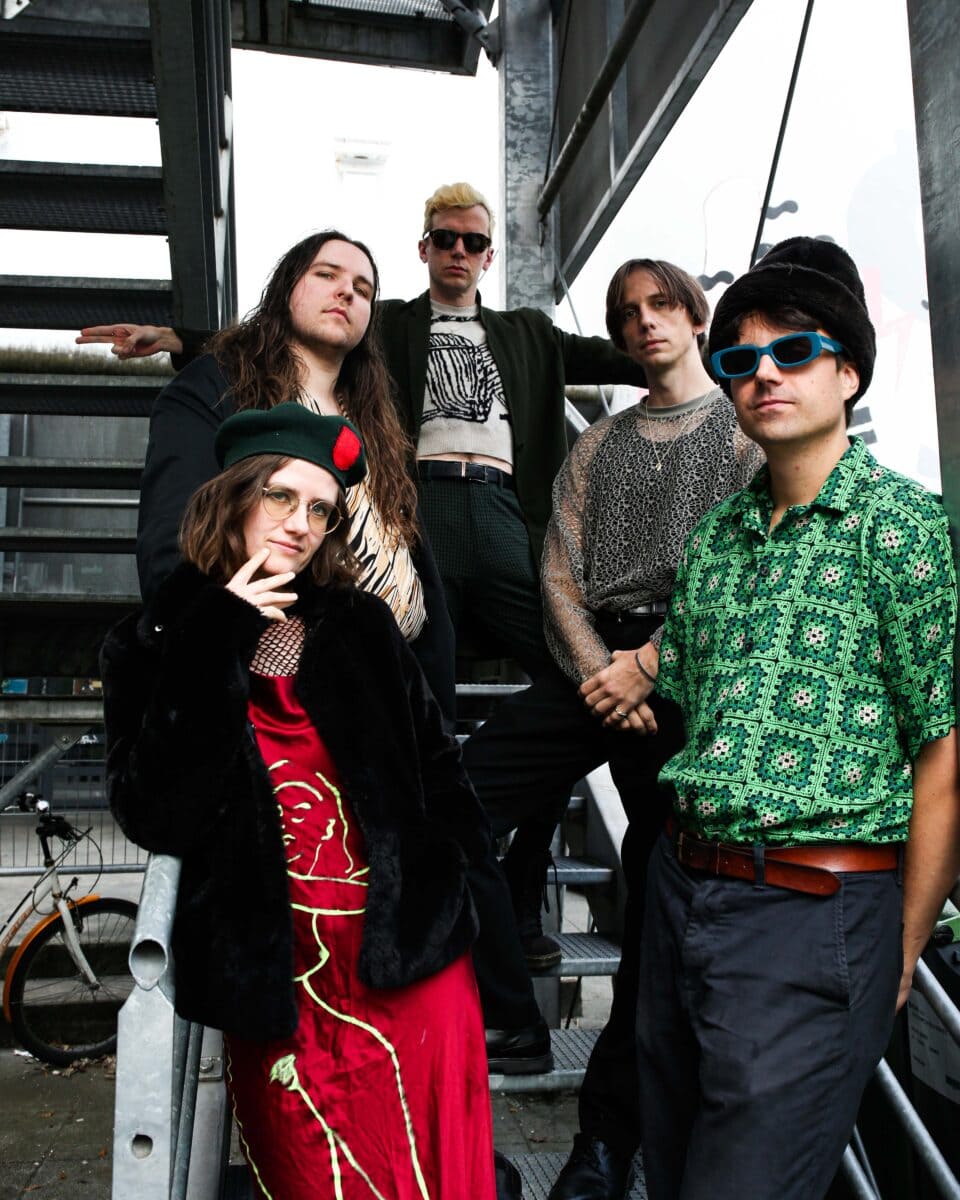
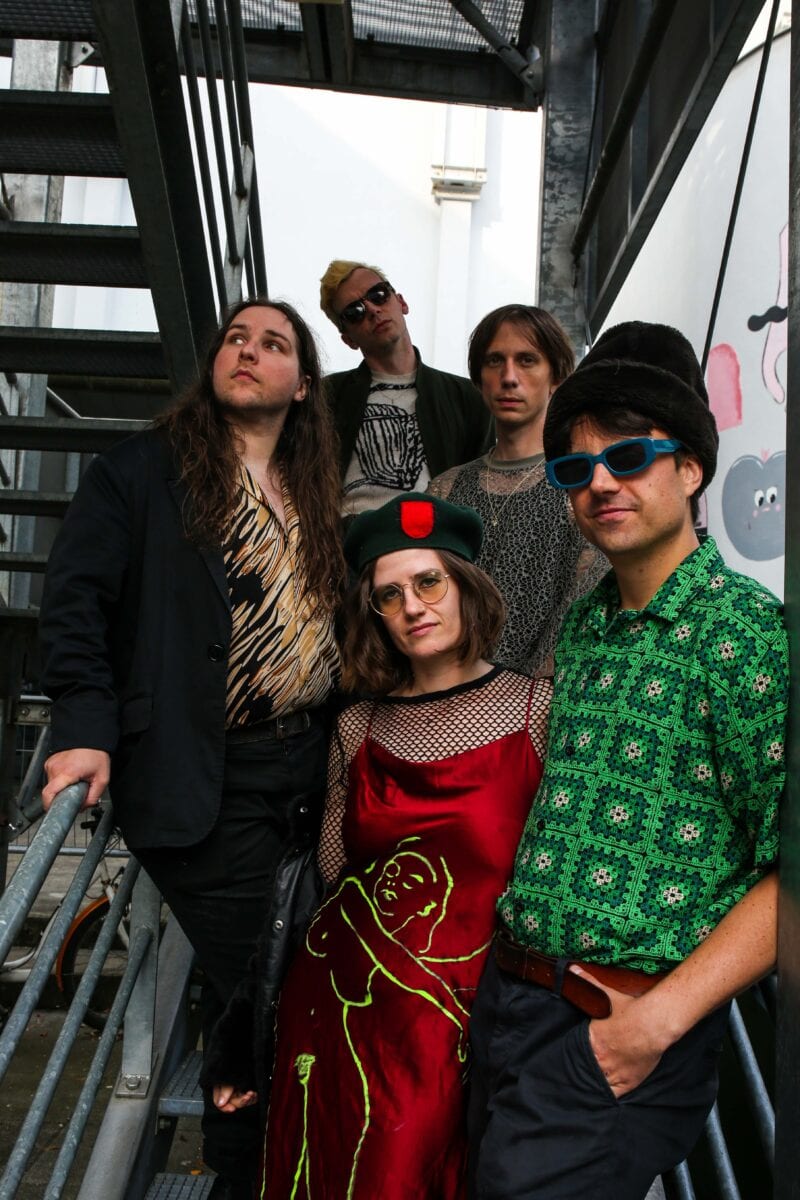

LFB: Your new album is coming out on 1st November, The Deluxe version.
Ben: It is seven new tracks that are meant to complement the record that we put out earlier this year. It has the song you mention in the 2-song novel but it also has brand new ones as well. Some were recorded after the fact. Three of them, Tim engineered them and we did them in May. Some were after the album and some of them were from the same session of the album like the song about The Adaptation of Marie, which is one of the best songs. But we had several ballads, and you don’t want more than 3 on a record.
When we pulled out singles, I really liked that bands put a B-side with the A-side. It is like a 60s thing like The Smiths were really good a curating B-sides. B-sides are kind of lost because when people put tracks up on Spotify, they really never have a B-side because there is no incentive to get people to try to buy either the CD single or the 7-inch.
Nikki: We went to the extreme because now we also have B-side albums.
Ben: I think it is cool because It frees you from making tracks that can exist separate from the statement of the album. I like pairing a B-side thematically with the track. For example, the song Thrown came with the track Everybody’s Sad which actually mentions Thrown in the song. It is like a complement to It. Adaptation of the Truth about Marie is also based on a novel by Jean-Philippe Toussaint. Takorvski is based on the Tarkovski Book. City is Taken is paired with New Age Spineless Sophists (N.A.S.S) cause they kind of both are a dissection of the New York Scene. Cultural Consumption III is paired with Cultural Consumption IV for obvious reasons.
LFB: The Cultural Consumption tracks are a tryptic but musically they can live on their own even if they share the same title. But they are linked. Now you mention Adaptation about The Truth about Mary, the music video is extremely funny. I would like to know how you manage to fit the story into a 3mn song and what was the creative choice for the music video?
Ben: That book made such an impression on me. I think that the best way to get creative is to get a contact hive from another artist. When you read a great book, you put it down and think “holy shit! this was so good, I have to make something in response to It”. And it is the goal of making music anyway. You want someone to hear your song and think I need to make a response to that, whether it is a painting or another song. Then I had a cheeky idea of making a film at the time that was an adaptation of a painting because I like this idea of adapting.
Filmmakers get to adapt novels all the time, why couldn’t a songwriter try that as an exercise. I am going to sort of tell the plot a bit but what really stuck me about that dramatic situation is that novel. The guy gets the phone call from his ex-girlfriend that he is still in love with. I am with the man I left you for and he is having a heart attack and I need your help. It is so amazing.
Nikki: You love romance.
Ben: It is so French because It is about se and death. There is such a thing about fluids in it because she is menstruating, and it is raining outside and it is so cinematic and elemental. It is amazing. I re-read all those four books recently and it blew my mind. I love that dramatic situation and was thinking like a filmmaker.
If I had to adapt two songs, what would I like this character to do? I added a new thing which I thought was kind of clever. The character lies: in the first chorus, he says “you told me about what’s his name” but the second time around when the intimacy is getting closer, he admits that he does know his name and everything about him. The climax is he is the third person in the scene in a dream. He is the third in a love triangle.
Nikki: So, what was the inspiration for the music video?
Ben: Because I re-read the book in the tub. My favorite hobby is getting a nice drink and sitting in a hot tub for about four hours with a book, especially in winter.
LFB: I am so clumsy, it is impossible for me to read in a tub.
Nikki: I am on my phone in the tub sometimes.
Ben: She is on her phone in the tub and I tell her “you are going to fry yourself”
LFB: You have a very cinematic thinking in your creative process. You say you always write the lyrics first.
Ben: Not always but I would say five out of eight times
LFB: That’s because you are a storyteller first and foremost.
Ben: I think so but when a lot of people write a song, they will mumble a melody, and they write a riff and have a mumble track and eventually they will fit the lyrics. I would say 9 out of 10 songwriters work that way from what I can tell. I have certainly worked that way too but what I found out is that if you write a poem with a set syllable count for each line and a meter, your phrasing becomes less cliched and it makes your melodies more interesting cause they must adapt to a text that is there already.
LFB: But there is a constraint because you have to fill a certain about of syllables and it can be restrictive.
Nikki: You can kind of fit anything into a melody.
Ben: It can change. If you write the lyrics, It is going to change when it comes out of your mouth.
LFB: In the new creative process, are all members of Bodega involved, chipping into the lyrics and writing your parts?
Tim: Adam wrote the lyrics on recent songs.
Adam: I think I do a little more than that.
Ben: Me and Nikki start with the germ of an idea. And Nikki is pretty critical with my lyrics. Usually, it involves me re-writing it until Nikki passes on it. And the same with me and her songs. Then we show it to Dan, and he helps with the arrangement and writes his own guitar parts and other things. Then, we bring it to the band and hopefully if we have time, we will play it live, road test it and adapt it.
Nikki: Part of the process is that Adam and Dan don’t live in New York. They live in Philadelphia and Baltimore which is hours away. So, the process of creating a song organically in a space does not really happen for us because we don’t get in spaces unless we are already working.
Ben: One good thing about our band is that these two guys are jazz backgrounds. Dan has a band called Super City, Adam has a band called The Lunar Year. Dan is also involved in bands. Tim has also a band called Big Bliss. I work with other bands, Nikki now works with other bands. We are all very comfortable with music.

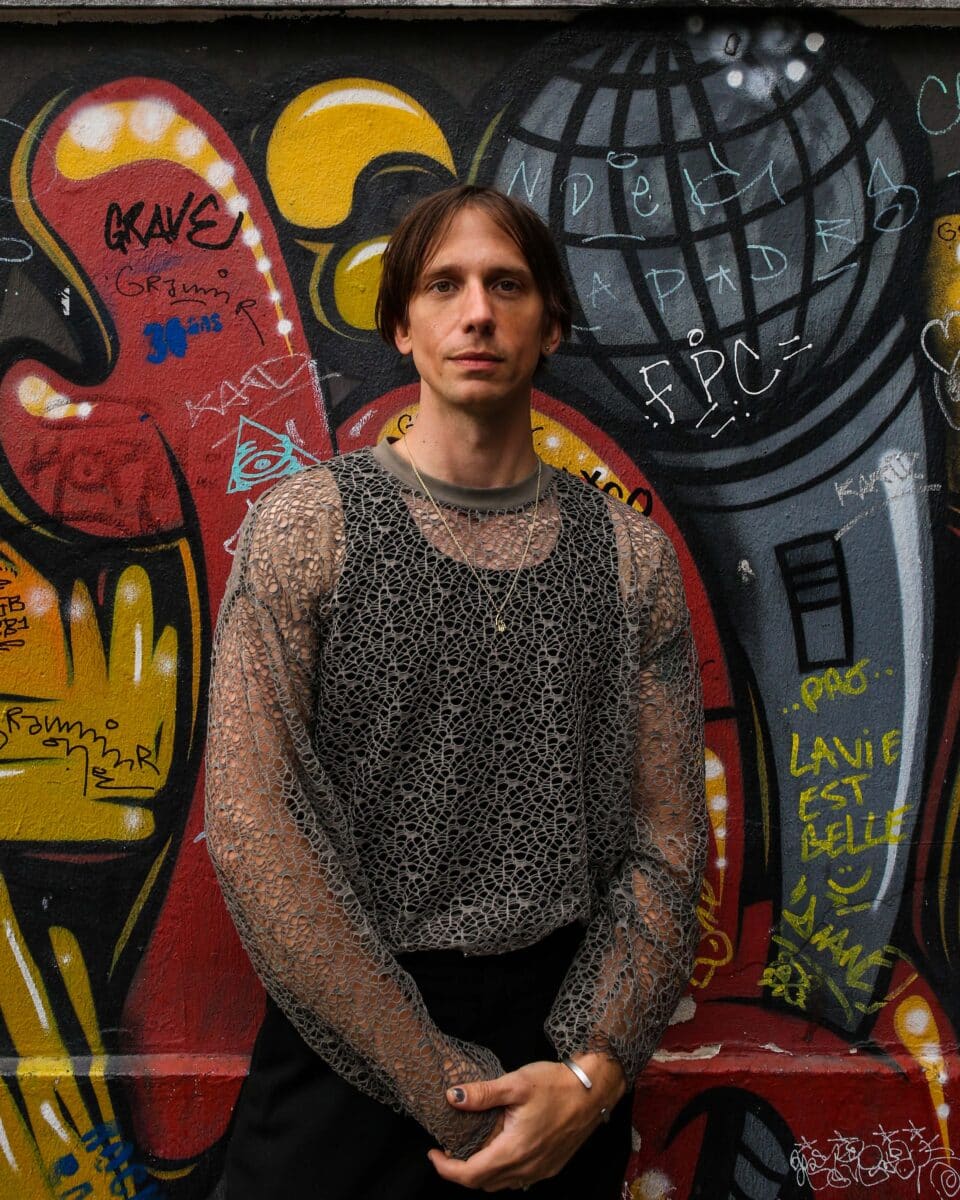
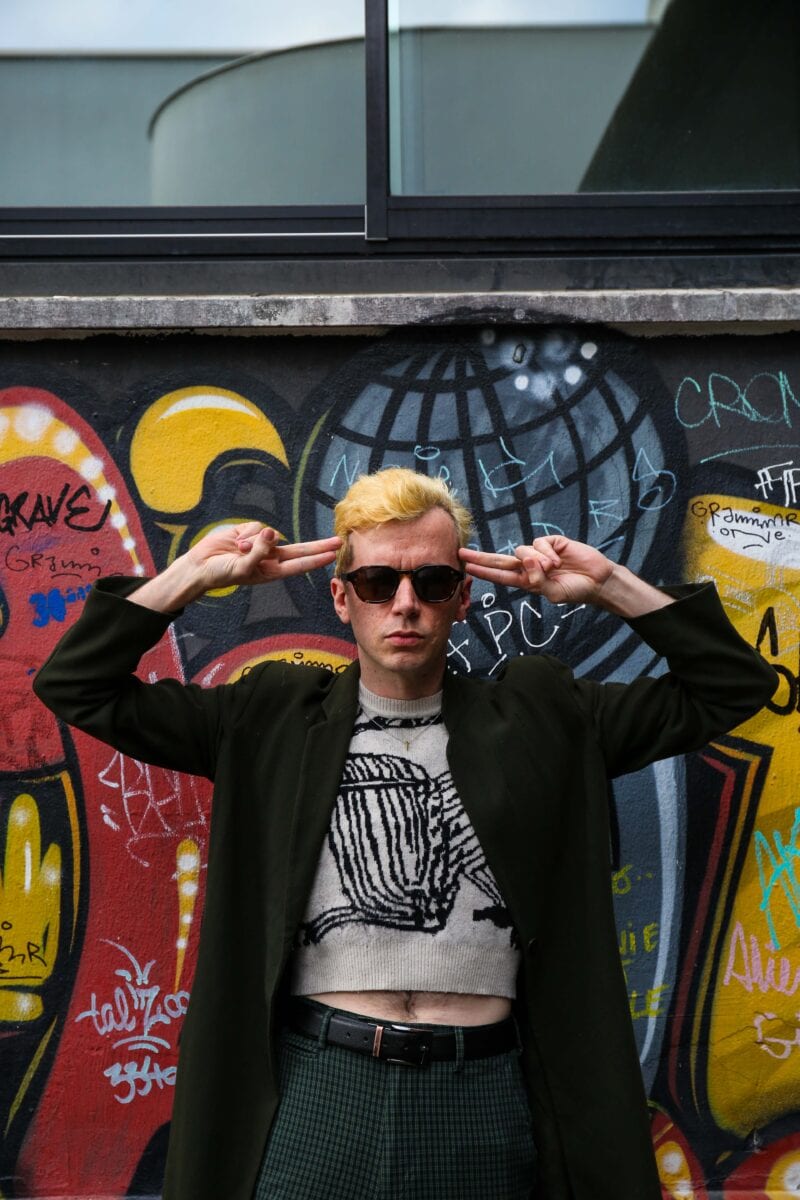
LFB: The Album Our Band could be Yr Life in April inspired by the book by Michael Azerrad. In what way did you take a step back to move on? This album revisits Bodega tracks from the past and in what way going back was vital in the process?
Ben: One thing about the theme of the band is that Bodega Bay started out was very confrontational musically. Initially when we started playing, we wanted to play Beatles songs. Then I realized that our ideas were not communicated properly because many people heard that band and assumed it was indie. It was a conceptual art project. When we made our first record, we presented ourselves in a more austere and minimalistic way and we sort of removed irony from our music.
What I like about Bodega Bay is when you sing a chipper pop song with devilish lyrics, there is an irony attention but if you play righteous music with righteous lyrics, there is no irony. Paradoxically we found great success with Endless Goals. You listen five minutes to that band, and you know where they are coming from, you get it.
But as the band has evolved, we have been trying to find ways to be ourselves and have our own sound. It is the best of both worlds: you can still sound tough, and you can be melodic and explore many different kinds of emotions. I think, by me going back especially with these guys finding better ways to play our songs, it is finding a way forward. And now we are writing the next album is far more melodic, far more musical and it is different. It is its own thing.
LFB: In this album, you tackle a lot consumerism. I know the tracks were written a while ago but these topics are even more accurate and relevant.
Nikki: We think that!
LFB: What you were writing eight years ago is still there now. Even more prominent now. In your new record, you will keep the fight?
Nikki: We actively are staying away from keywords but we will still be talking about it.
Ben: We have been thinking about “our band could be yr life”, “Broken Equipment” and “Witness Scroll” as a trilogy as the three of them compliment each other thematically and musically in different ways. The next thing is Nodega and is all about consumerism but the fourth official album will be its own thing and separate.
Nikki: we, as artists, are very conscious about the space we live in, Ben particularly. But we are actively trying to reach on other topics. I realized I have never written a love song.
LFB: Our band could be Yr Life can be very complex and illuminating as a body of work. I enjoyed ATM.
Nikki: You would watch Dan’s hands when he does the ATM solo.
LFB: You are acute society observers
Nikki: We are like Jesters.
LFB: I enjoyed Born into what consumes. I thought it could have been the intro track that sets the tone of the album. It is in the middle but would have equally fitted as the first track as a sharp intro.
Ben: It is the Manifesto of the record. That song was originally called Cultural Consumption V
LFB: ATM has a very 90s feel, quite fun and shoegazy. For the last track, it was great to have Nikki to sing this song and the music video introduce New York as the second main character.
Nikki: It goes back to the first question you asked us about how New York impacts us as artists. As that was encapsulated on the ten years of more I have lived there. Especially living through gentrification, and changes. Being an artist felt almost predatory in all the spaces you are walking in. Realizing the guilt can only get you so far is not helpful because it kind of paralyzes you and makes you less interesting. But also, it is not only your burden and you should not have to carry it by yourself.
LFB: Thank you so much for your time and for this delightful exchange.
Bodega: Thank you, your questions were so thoughtful!
Follow Bodega on Instagram, Spotify or on Tour
